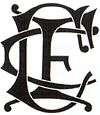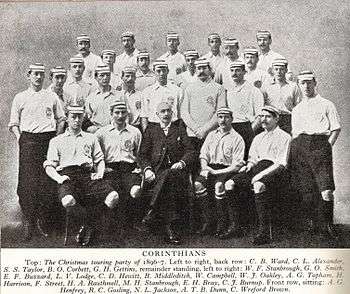Corinthian F.C.
 | ||
| Founded | 1882 | |
|---|---|---|
| Dissolved | 1939 (merged with Casuals F.C.) | |
| Ground | Queen's Club, Crystal Palace, The Oval | |
| League | none | |
|
| ||
Corinthian Football Club was an English amateur football club based in London between 1882 and 1939.[1]
History
The club was founded on 28 September 1882 by N. Lane Jackson, Assistant Secretary of the Football Association (The FA).[1] At that time football was still amateur, with the English game dominated by southern clubs; Old Etonians were the reigining FA Cup champions. In international football (which had not yet spread beyond the home nations), Scotland prevailed,[2] having won three consecutive matches over England by scores of 5-1, 6-1 and 5-4.
Jackson attributed Scotland's success to "the greater opportunities our opponents over the border [have] of playing together", and aimed to counteract this by forming a club "composed of the best amateur players in the kingdom".[2][1] In order to accomplish this aim, Corinthian F.C. took care to avoid playing matches on Saturdays (when players might be playing for other clubs). The first proposed name for the club was the "Wednesday Club", but this was changed to the "Corinthian Football Club" on the suggestion of Harry Swepstone.[2]
The club was also founded to promote sportsmanship and fair play,[3] and champion the ideals of amateurism,[4] The players were famed, above all, for their ethos of “sportsmanship, fair play, [and] playing for the love of the game”.[5] ‘Corinthian Spirit’, understood as the highest standard of sportsmanship, is often associated with the side. This spirit was famously summed up in their attitude to penalties; “As far as they were concerned, a gentleman would never commit a deliberate foul on an opponent. So, if a penalty was awarded against the Corinthians, their goalkeeper would stand aside, lean languidly on the goalpost and watch the ball being kicked into his own net. If the Corinthians themselves won a penalty, their captain took a short run-up and gave the ball a jolly good whack, chipping it over the crossbar”.[6]
"Within twenty years the Corinthians were to become the greatest and most attractive team that football had then known. With an intelligent nonchalance and in their tailored shirts and well-cut shorts they brought a quality and culture to the game".[7]
The club’s foreign tours are also credited with having popularised football around the world; they were the first club to take the sport outside Europe;[1] the 2000 and 2012 FIFA Club World Champions, SC Corinthians Paulista, are named after the club (indeed, Charles Miller considered the father of football in Brazil, played for the club in 1892),[6] and the 2015 FIFA Club World Champions, Real Madrid, wear white to this day in their honor.[8]
The club played at various venues including the Queen's Club,[9] The Oval, and the old Crystal Palace. On 12 April 1939, the Corinthians played their last match.[1] They merged with Casuals F.C. to form a new club, Corinthian-Casuals F.C.

Given that the club’s constitution declared that it should “not compete for any challenge cup or any prize of any description”[4] the team originally only played friendly matches. An exception was later made for the Sheriff of London’s Charity Shield. The club might have won the FA Cup many times had they competed — shortly after Blackburn Rovers beat Queen's Park in the 1884 final, the Corinthians beat Blackburn 8–1.[1] Similarly, against the Bury side that beat Derby County 6–0 in the 1903 final, Corinthian won 10–3.[1] In 1904, Corinthian beat Manchester United 11–3[1] which remains United's biggest ever defeat.
Corinthian did, however, supply large numbers of players to the England football team. During the 1880s, the majority of England caps were awarded to Corinthian players[1] and, for two England matches against Wales in 1894 and 1895, the entire team consisted of members of the club,[1] although most of the Corinthian players had another primary club affiliation, usually their University side.
During 'The Split', the 1907–1914 dispute about professional clubs being admitted to membership of the country Football Associations, Corinthian F.C. pledged its allegiance to the Amateur Football Alliance, as did Oxford University and Cambridge University. Corinthian therefore, banned from playing top home opposition by The FA, increased the frequency of their foreign tours; "Corinthian FC had little option but to concentrate on their [footballing] missionary work overseas and of the 131 matches played before 'The Split' was resolved in January 1914, 72 were played abroad".[1]
Among others, Real Madrid were inspired to adopt Corinthian's strip while Sport Club Corinthians Paulista in Brazil and Zejtun Corinthians in Malta adopted their name. After a visit to Sweden in 1904, a Swedish tournament called the Corinthian Bowl was set up in commemoration.
Their tours included South Africa, Canada, the United States, Hungary, Czechoslovakia, Spain, Denmark, Holland, Austria, Sweden, Switzerland, Brazil, Ireland, Jamaica and Germany.
Club honours
Corinthian usually played only friendly matches and the only trophies they competed for were charitable events. They played in the Sheriff of London Charity Shield nine times, winning three, between 1898 and 1907 when the match was replaced in the calendar by the FA Charity Shield.[10] They competed in the 1927 FA Charity Shield against FA Cup winners Cardiff City, losing 2-1 at Stamford Bridge.[11]
England International Players
In all, Corinthian FC had 86 England Internationals, 12 Welsh Internationals, 8 Scottish Internationals and 2 Irish Internationals.
Corinthian's famous players include many sporting polymaths, including Max Woosnam and C. B. Fry.
Danish international Nils Middelboe played for Corinthian after finishing his career with Chelsea.
Many players played for Corinthian as a secondary club while playing for another primary club. The 17 players[12] listed below are those that had Corinthian FC as their principal club:[13]
- Claude Ashton (1 cap)
- Alfred Bower (5 caps)
- Jackie Burns (16 caps)
- Bertie Corbett (1 cap)
- Norman Creek (1 cap)
- Graham Doggart (1 cap)
- Tip Foster (4 caps)
- C. B. Fry (1 cap)
- Kenneth Hegan (4 caps)
- Arthur Henfrey (4 caps)
- Cecil Holden-White (2 caps)
- Anthony Hossack (2 caps)
- Vaughan Lodge (2 caps)
- Bernard Middleditch (1 cap)
- William Oakley (12 caps)
- Basil Patchitt (2 caps)
- G. O. Smith (7 caps)
- Geoffrey Plumpton Wilson (2 caps)
References
- 1 2 3 4 5 6 7 8 9 10 11 Cavallini, Rob (2007). Play Up Corinth: A History of the Corinthian Football Club. Tempus Publishing. p. 99. ISBN 978 0 7524 4479 6.
- 1 2 3 Corbett, B. O. (ed.) (1903). Annals of the Corinthian Football Club. London: Longmans, Green, and Co. pp. 3–5.
- ↑ Collins, Mick (2006). All-Round Genius: The Unknown Story of Britain's Greatest Sportsman. Aurum Press. p. 46. ISBN 1 84513 137 1.
- 1 2 Taylor, D.J. (2006). On the Corinthian Spirit. Yellow Jersey Press. p. 50. ISBN 9780224075855.
- ↑ Minto, Peter (2013). The Flying Sportsman: A Biography of FNS Creek. Memoirs Publishing. p. 41. ISBN 978-1-86151-030-3.
- 1 2 Lacey, Josh (2005). God is Brazilian. Charles Miller: The Man Who Brought Football to Brazil. Tempus Publishing. p. 71. ISBN 0 7524 3414 4.
- ↑ Grayson, Edward (1955). Corinthians and Cricketers. Yore Publications. p. 24. ISBN 1 874427 71 2.
- ↑ Heralta, Alvaro (May 29, 2013). "Corinthian, the reason why Real Madrid dress in white". Real Madrid News.
- ↑ McKelvie, Roy (1986). The Queen's Club Story, 1886-1986. Century Hutchinson. p. 54. ISBN 0 09 166060 2.
- ↑ Corbett (ed.), B. O. Annals of the Corinthian Football Club, page 159. LONGMANS, GREEN, AND CO. Retrieved 27 January 2017.
- ↑ "Corinthians Beaten by Cardiff City". The Times. 13 October 1927. p. 6.
- ↑ "England Player's Clubs". England States. Retrieved 20 March 2015.
- ↑ Club Affiliations – Corinthians
Further reading
- Morris, Terry (2015). In A Class of Their Own: A History of English Amateur Football. Chequered Flag Publishing. ISBN 978-0-9932152-4-7.
- Taylor, D.J. (2006). On The Corinthian Spirit: The Decline of Amateurism in Sport. Yellow Jersey Press. ISBN 9780224075855.